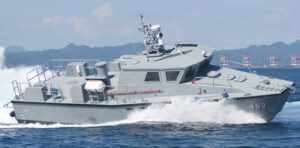By Kyle Aristophere T. Atienza, Reporter
THE PHILIPPINES needs to grant incentives and develop supplier clusters for shipbuilders to help them become competitive exporters, shipyard operator Propmech Corp. said.
The lack of such support is preventing the industry from achieving economies of scale, affecting its export-competitiveness, Propmech Director Glenn Tong told BusinessWorld during a media tour of its Subic freeport shipyard last week.
Apart from Subic, Propmech operates yards in Mandaue City, Cadiz, Negros Occidental, General Santos City, Puerto Princesa, and Zamboanga City.
“Shipbuilding in the Philippines is something that we can develop not only for ourselves but for exports in the future. The government should look into creating high-value products that can be utilized for exports.”
Mr. Tong said the industry will require marine-related businesses like ship repair and maintenance and parts makers to cluster in key areas, simplifying supply chains.
“In other countries, they patronize their own shipbuilders and give them support and locations where they can operate. Over time, they dominate world markets,” he said.
Incentives for shipbuilders are also necessary over the medium term, noting that it will take “some time” for their business to become profitable under present conditions.
Propmech supplied 12 of Philippine Navy’s Multi-Purpose Attack Craft (MPAC) — the company’s flagship vessels — between 2009 and 2019, three of which recently completed comprehensive maintenance and refurbishment work at its Subic facility.
“In this specific batch, they wanted to bring all the equipment back to new,” Mr. Tong said, referring to a batch of three MPACs acquired in 2016.
“We were able to bring the vessels back to new — back to original performance,” he said. “It is more of a return to original form.”
The missile-capable MPACs are “a testament to us being able to build a vessel that no other country was interested in building,” Mr. Tong noted.
Mr. Tong said his company hopes to supply government agencies with more vessels.
“We are talking with the Department of National Defense, the Navy, and the Philippine Coast Guard and other entities to provide some equipment. It’s under negotiation. There are discussions ongoing.”
Propmech said its “versatile” MPACs have been active in the Navy’s counterterrorism and territorial defense mission.
Joshua Bernard Espeña, vice-president at Manila-based International Development and Security Cooperation, said the shipbuilding industry needs to “identifying where the country can establish a niche position in parts of the ship/combat system.”
“While going independent sounds patriotic, it needs to be put into perspective. The global defense industry is vast with relatively more mature industries out there,” he said in a Facebook Messenger chat.
“It should identify where it can niche, perhaps hull design or installation of weapons for small ships like patrol boats or frigates, and eventually consider competing in the global market,” he added. “The Philippines can consider looking into compatible and efficient designs for other parts of maritime platforms.”
Philippine shipyards numbered 124 in 2022, up from 116 in 2021, according to the Maritime Industry Authority.
The shipbuilding industry, which has had to contend with weak domestic demand, also has to deal with expensive electricity and high production costs, being dependent on imports of key materials for making ships such as steel and resin, according to Mr. Tong.
The shipbuilding industry is also vulnerable to shocks like conflict in key global waterways, according to George N. Manzano, a trade expert at the University of Asia and the Pacific.
“Geopolitics (and) trade embargoes can create shocks to the shipping industry and thus indirectly affect shipbuilding,” he said in an e-mail.
It is also among the industries under pressure to employ sustainable and environmentally friendly practices as governments seek to advance the transition to clean energy, he added.
The shipping industry accounted for 1.015 million tons of carbon dioxide emissions globally from 2007 to 2012, according to an International Maritime Organization report.
The government should incentivize shipyards and “make regulation of shipyards and general maritime operations more efficient and simpler,” Mr. Manzano said.
Propmech has over 900 employees, but it said it is threatened by a declining appetite among young people to take on industrial jobs.
“The number of young people who want to do the harder manual labor jobs has gotten less. Everyone wants to work in an office,” Mr. Tong said.
Mr. Manzano said education agencies should work together to make the workforce responsive to the demands of the maritime industry. The government should also support training institutions offering maritime courses and help them adopt shipbuilding curricula in line with international standards, he added.
“Foreign investment can bring in the expertise in terms of training because there could be skill gaps particularly in aspects of more advanced shipbuilding technology,” he added.
